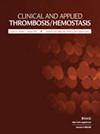Efficacy and Safety of Long-Term Dual Antiplatelet Therapy: A Systematic Review and Meta-Analysis
IF 2
4区 医学
Q2 HEMATOLOGY
引用次数: 0
Abstract
BackgroundDual antiplatelet therapy (DAPT) with aspirin and a P2Y12 inhibitor is a standard therapy in patients with ischemic vascular diseases (IVD) including coronary artery, cerebrovascular and peripheral arterial diseases, although the optimal duration of this treatment is still debated. Previous meta-analyses reported conflicting results about the effects of long-term and short-term as well as non-DAPT use in various clinical settings. Herein, we conducted a comprehensive meta-analysis to assess the efficacy and safety of different durations of DAPT.MethodsWe reviewed relevant articles and references from database, which were published prior to April 2023. Data from prospective studies were processed using RevMan5.0 software, provided by Cochrane Collaboration and transformed using relevant formulas. The inclusion criteria involved randomization to long-term versus short-term or no DAPT; the endpoints included at least one of total or cardiovascular (CV) mortalities, IVD recurrence, and bleeding.ResultsA total of 34 randomized studies involving 141 455 patients were finally included. In comparison with no or short-term DAPT, long-term DAPT reduced MI and stroke, but did not reduce the total and CV mortalities. Meanwhile, bleeding events were increased, even though intracranial and fatal bleedings were not affected. Besides, the reduction of MI and stroke recurrence showed no statistical significance between long-term and short-term DAPT groups.ConclusionLong-term DAPT may not reduce the mortality of IVD besides increasing bleeding events, although reduced the incidences of MI and stroke early recurrence to a certain extent and did not increase the risk of fatal intracranial bleeding.长期双联抗血小板疗法的有效性和安全性:系统回顾与元分析
背景使用阿司匹林和 P2Y12 抑制剂的双重抗血小板疗法(DAPT)是缺血性血管疾病(IVD)(包括冠状动脉、脑血管和外周动脉疾病)患者的标准疗法,但这种疗法的最佳持续时间仍存在争议。之前的荟萃分析报告了在不同临床环境中长期、短期以及非 DAPT 治疗的效果,结果相互矛盾。在此,我们进行了一项全面的荟萃分析,以评估不同DAPT持续时间的疗效和安全性。方法我们从数据库中查阅了2023年4月之前发表的相关文章和参考文献。前瞻性研究的数据使用 Cochrane 协作组织提供的 RevMan5.0 软件进行处理,并使用相关公式进行转换。纳入标准包括随机选择长期 DAPT 与短期 DAPT 或无 DAPT;终点包括总死亡率或心血管(CV)死亡率、IVD 复发率和出血量中的至少一项。与无DAPT或短期DAPT相比,长期DAPT降低了心肌梗死和中风的发生率,但并未降低总死亡率和心血管疾病死亡率。同时,出血事件有所增加,尽管颅内出血和致命性出血未受影响。结论长期 DAPT 除了增加出血事件外,可能不会降低 IVD 的死亡率,但在一定程度上降低了 MI 和卒中早期复发的发生率,也没有增加致命性颅内出血的风险。
本文章由计算机程序翻译,如有差异,请以英文原文为准。
求助全文
约1分钟内获得全文
求助全文
来源期刊
CiteScore
4.40
自引率
3.40%
发文量
150
审稿时长
2 months
期刊介绍:
CATH is a peer-reviewed bi-monthly journal that addresses the practical clinical and laboratory issues involved in managing bleeding and clotting disorders, especially those related to thrombosis, hemostasis, and vascular disorders. CATH covers clinical trials, studies on etiology, pathophysiology, diagnosis and treatment of thrombohemorrhagic disorders.

 求助内容:
求助内容: 应助结果提醒方式:
应助结果提醒方式:


